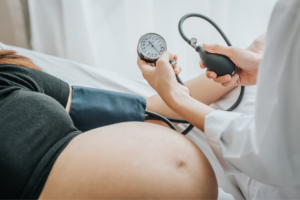27. Stress and Pregnancy
**This is a repost of a classic Informed Pregnancy article.
"Stress is also implicated in decreased birth weight. The hormones that are released in a chronic stress state affect blood vessel constriction and may decrease the appetite of the mother, in turn affecting the growth of the fetus."

Pregnancy can be an anxiety-provoking time. Not only are there constant new and often unexpected physical changes, preparing to be a parent is also emotionally taxing. While we mostly focus on things like eating nutritious food, avoiding toxins, and taking prenatal yoga classes when we talk about ‘having a healthy pregnancy,’ we should also consider our mental wellbeing and how chronic stress might adversely affect pregnancy. There is a normal amount of stress in any pregnancy, but chronic or extreme stress – like what one might experience after a death in the family, or a stressful living or financial situation, can have a significant impact on a woman’s pregnancy. Although some of the links between stress and adverse outcomes in pregnancy are not clear, we do know that in response to perceived stress our brains secrete corticotropin releasing hormone (CRH). Correlations have been made between increased levels of this hormone and an increased risk of preterm birth and even miscarriage.
Follow Dr. Berlin on Instagram to stay up to date on The Informed Pregnancy Project!
Stress is also implicated in decreased birth weight. The hormones that are released in a chronic stress state affect blood vessel constriction and may decrease the appetite of the mother, in turn affecting the growth of the fetus. Additionally, chronic stress can decrease the effectiveness of a mother’s immune system, leaving her more prone to viruses and bacteria. Not only are there possible short term effects of stress, there are some researchers who believe that there is a connection between chronic stress in pregnancy and the emotional, behavioral, and physical development of children later in life. Again, these links are not clear, but it makes sense to try to decrease chronic stress during pregnancy as much as possible.

What are some effective ways to reduce stress?
Sit in silence. In our high-tech environment, the overstimulation surrounding us is not conducive to a relaxed, stress-free pregnancy. Try meditation or a long bath or shower, focusing on breathing deeply in and out. Move. Exercise has been proven to reduce stress, lift your mood, and give you more energy. This is excellent during a time when one feels sluggish and emotional. Avoid negative energy. Turn off the television if it is provoking fear or anxiety. Avoid conflict at work and, if possible, in your family and social life. Therapeutic massage. A good massage by someone trained to work with pregnant patients reduces bodily tension on muscles and bones that are bearing more weight than usual as your baby grows.
A massage can also help with posture and breathing. Stretching is an effective adjunct to this. Express your emotions. Laughter and crying are effective ways to release any tension that might be held inside. We all know how cathartic it can be to have a good cry! Realize you can’t do it all. Accepting that not everything is under our control can help ease anxiety. Saying no to projects or tasks that may be too difficult is okay, especially during a time when your body is vulnerable. Seek out social support. Confiding in family and friends or in a healthcare professional can help alleviate stress.
Check out this new post on the Informed Pregnancy Blog!
 Dr. Kathleen Valenton received her Bachelor’s Degree in Psychology from the University of California, Berkeley. After earning her Master’s Degree in Psychology and working as a senior therapist for children with Autism, she went on to receive her Medical Degree from the prestigious University of Vermont College of Medicine, consistently rated one of the top 10 medical schools in the country. She received exceptional training in Obstetrics and Gynecology at the highly acclaimed Cedars-Sinai Medical Center, and has continued to serve on staff as an attending physician providing optimal obstetric care and offering operative gynecologic procedures. She participates in resident education, and is highly involved in nursing and MD collaborations. She has recently extended her practice to the well-reputed St. John’s Medical Center. Her main interests in the field of OB/GYN are in obstetrics, pelvic pain, infertility evaluation, and minimally invasive surgery. Her focus of research includes Infertility, Polycystic Ovarian Syndrome, Vitamin D Deficiency, Anorexia and Bulimia in Adolescents, and Social Media and Medicine.
Dr. Kathleen Valenton received her Bachelor’s Degree in Psychology from the University of California, Berkeley. After earning her Master’s Degree in Psychology and working as a senior therapist for children with Autism, she went on to receive her Medical Degree from the prestigious University of Vermont College of Medicine, consistently rated one of the top 10 medical schools in the country. She received exceptional training in Obstetrics and Gynecology at the highly acclaimed Cedars-Sinai Medical Center, and has continued to serve on staff as an attending physician providing optimal obstetric care and offering operative gynecologic procedures. She participates in resident education, and is highly involved in nursing and MD collaborations. She has recently extended her practice to the well-reputed St. John’s Medical Center. Her main interests in the field of OB/GYN are in obstetrics, pelvic pain, infertility evaluation, and minimally invasive surgery. Her focus of research includes Infertility, Polycystic Ovarian Syndrome, Vitamin D Deficiency, Anorexia and Bulimia in Adolescents, and Social Media and Medicine.


